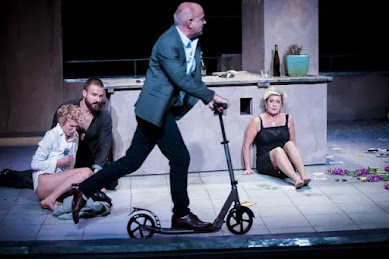Somehow, the play Who's Afraid Of Virginia Woolf? has been a constant presence in my life.
I watched it back when I was a kid, late at night, with my sister, when the adults were not at home. We watched the famous movie adaptation from 1966 starring Richard Burton and Elizabeth Taylor. I do not believe I understood it back then but it still had a profound effect on me - the kind that grips you and you cannot quite explain why. It felt funny and it felt tragic and then Elizabeth Taylor delivered those final words and I just wanted to become a playwright.
Later, I read the play when I was twenty and bedridden in hospital. By then, the worst days were behind me and I needed to read something as part of my recuperation process. One of the books that I requested was, quite inexplicably, Edward Albee's Who's Afraid Of Virginia Woolf? It provided a lot of hysterical laughter but it also delivered a few hard-hitting blows that brought me ever closer to understanding the play.
Later still, I used it (along with Edward Albee's other famous piece, The Zoo Story) in my University thesis on effects of the Theatre of the Absurd. Here, I delved deep into the play and its two main protagonists and even the title that had always intrigued me to no end.
And now, years later, I finally did it last night. I saw the stage adaptation of Who's Afraid Of Virginia Woolf? at Teatr Polonia in Warsaw. Needless to say, anything less than special would not have done it - and, thankfully, they did it justice. Which means it was very special indeed.
The audience was very much alive, to a fault - but that is the sinister magic of Albee's play, that masterful interplay of humour and deadly seriousness. This interplay repeatedly catches the audience unawares, and time and time again the fallout of laughter gets in the way of another line that is absolutely devastating in its brutal and unforgiving gravity. These are awkward moments, but they were planted into the devious tapestry of the play from the very beginning. In a way, they are the whole point of what you are witnessing.
And they, too, are the trap (similar to the one that the young couple fall into, naively and continuously), for placing them alongside each other in such a rapid and incessant succession requires utmost concentration and taste on the part of the director and the cast. But even taking into account the degree of difficulty, the Polish adaptation is a great success and adds a new power and poignancy to Martha's affectionate monologue towards the end of the second act. This version was not perfect (none of them are), and the decorations seemed a little too faceless and unimaginative to my liking, and sometimes the 1966 film is conjured followed too closely, but in the end - all my complaints fade away and cease to matter. Because each adaptation is different, and each throws a great surprise when you least expect it (the Pink Floyd song at the start of Act Two was not on the cards). Because, crucially, with every adaptation you get closer to the truth which is never too obvious and always elusive in the case of Albee's play.
Needless to say, the performances were entirely in Polish and I would not have been as ecstatic had I not learned the play by heart ages ago. Some lines are hissed, some are whispered, and your grip on the language has to be sublime. Sadly, the two girls who were leaving the theatre behind me were not as fortunate. They were Americans, and they kept complaining about how they had not understood anything that was going on in the play. All that arguing, all those accusations... They kept bringing it up again and again, and at some point and in my mind their words and their questions started to string themselves together into the immortal catchphrase coined by Edward Albee. The one that is also the title of this classic play.
